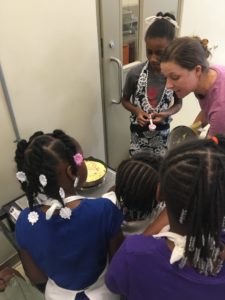By Hadiyah Page, 2020 Schweitzer Fellow
During adolescent years, social and emotional skills are developed in parallel with pubescent experiences. In light of COVID-19, middle and high school students in Birmingham face additional obstacles that influence their social and emotional health and development and will carry over to other areas of life in the future. This combination can be especially tender for those that have experienced the effects of gun violence and mass incarceration – both directly and indirectly. And while the city of Birmingham seeks to reduce the rates of gun violence, many of its 99 neighborhoods lack the resources to properly address trauma and begin the healing process among their residents. Through utilization of trauma-informed creative outlets and mindfulness practices, middle and high school students in Birmingham can develop healthy coping mechanisms, formulate and maintain positive self-images, and increase productivity in other areas of life while making sense of the world around them.
Art therapy is a blended field of therapeutic practice that combines art and psychology, through utilizing the creative process, artistic techniques, and external artwork to support individuals to develop self-awareness, explore emotions and address unresolved conflict or trauma. Research has shown that the non-verbal right brain holds traumatic memories and these can be accessed through the use of symbols and sensations in art therapy. Art psychotherapist Janice Lobban found in her research that communication between the brain hemispheres can be accomplished through the use of art therapy and can assist in the processing of the trauma. As the brain matures, creative activities enhance the ability to think critically, express and control emotions, develop healthy personal and interpersonal relationships, and communicate effectively with others.
While there is a formal training process to become a certified art therapist, parents can still learn and apply some of the techniques to help their children process challenges caused by COVID-19 and other traumas. For youth and parents seeking to adopt more conscious health practices, mental health professionals have developed a set of guidelines:
- Start the conversation – “ How do you feel about what’s happening in the world or at home?” or “What are you or your friends talking about in terms of current events?”
- Reassure them – Things will get better and you will be there for them.
- Listen – Show that you understand their perspective and ask follow-up questions.
- Find out what they know and answer questions, even if you do not know the answer. – “That’s an interesting question, and I don’t know the answer. How can we find that out together?”
- Encourage children to share their feelings.
- Share your feelings.
Quick start guide
One quick and easy idea for parents would be using recycled cardboard to create a memory clock. Through reflection, children are able to identify pivotal life events -both good and bad- and proceed with their healing process. This activity, and others like it, can be found in the resources below:
Ready to grow on the path of trauma-informed education through art therapy?
Visit the incredible authors and resources below, via Diversified Consulting
- 101 Mindful Arts-Based Activities to Get Children and Adolescents Talking: Working with Severe Trauma, Abuse and Neglect Using Found and Everyday Objects (Dawn D’Amico)
- The Big Book of Therapeutic Activity Ideas for Children and Teens: Inspiring Arts-Based Activities and Character Education Curricula (Lindsey Joiner)
- Free Video Series: Trauma Training For Educators (ACES in Education)
- Essentials for Creating A Trauma-Sensitive Classroom (LINK)
- The Art Therapy Sourcebook (Cathy Malchiodi)
- Art Heals: How Creativity Cures the Soul (Shawn McNiff)
- DBT® Skills Training Handouts and Worksheets, Second Edition (Marsha M. Linehan):
Hadiyah Page is a student in the UAB School of Public Health pursuing an MPH in Maternal and Child Health. As a 2020 Alabama Schweitzer Fellow, Hadiyah is collaborating with Impact Family Counseling and Tarrant High School to address trauma caused by gun violence and mass incarceration by introducing trauma-focused creative arts. Ultimately, the program aims to reestablish a positive self-image within youth and help them understand how to turn their trauma into triumph.




